MercoPress. South Atlantic News Agency
Tag: Tabare Aguerre
-
Wednesday, January 17th 2018 - 08:37 UTC
Uruguayan farmers surprise government and take to the roads to protest fiscal policies
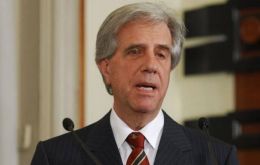
Uruguayan farmers with their tractors, harvesters, trucks, vans and on horseback took to the roads to protest the cost of fuel, power, increased taxes and an over bloated national budget and bureaucracy which they blame for making several farm activities unprofitable, and have had an overall negative impact for the different camp activities.
-
Thursday, September 7th 2017 - 07:37 UTC
Expo-Prado agro-industrial show opens in Montevideo
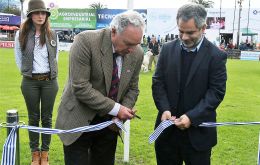
Uruguay's main agricultural, industrial and commercial show, Expo/Prado 2017 opened in Montevideo on Wednesday. The annual event, which this year is international, (it rotates with Argentina's Palermo show) is an opportunity for city people to admire the best cattle, sheep, horses and hogs of the region, and for the farmers a chance to see how much technology has advanced in the last twelve months.
-
Monday, June 2nd 2014 - 07:13 UTC
Vazquez, Lacalle Pou and Bordaberry: one the three will be Uruguay's next president

Sunday's primaries in Uruguay cleared the way for the candidates of the four parties with legislative representation that will be disputing the presidential election next October 26, with a run-off a month later if none of them manages 50% plus one of ballots.
-
Thursday, November 14th 2013 - 18:07 UTC
Uruguay and US reach sanitary agreement on boneless lamb, beef, offal and live cattle
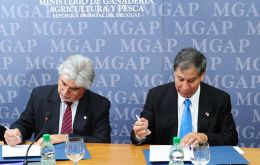
Boneless and matured lamb and mutton from Uruguay will have access to the United States market as of next 29 November. The announcement was made in Montevideo by visiting US Agriculture Under Secretary Edward Avalos, following its publication in the US Federal Registry and means the conclusion of nine years of negotiations.
-
Thursday, September 26th 2013 - 06:34 UTC
Storm death toll of recently sheared sheep in Uruguay climbs to 54.200, not counting lambs

The recent rain, wind and cold storm that severely punished Uruguayan farmers last week caused the death of 54.200 adult sheep. The sum from a survey conducted by the Uruguayan Wool Secretariat, SUL, almost doubles the original 30.000 estimate and does not include the recently born lambs.
-
Thursday, July 11th 2013 - 07:14 UTC
After twenty years of negotiations US opens its market to Uruguayan citrus
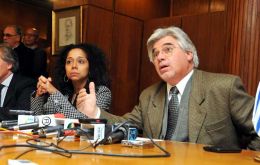
After almost twenty years of negotiations United States confirmed the opening of its market to citrus from Uruguay, which will become effective next 9 August when certain coordination and logistics tasks are coordinated by both countries.
-
Sunday, April 1st 2012 - 08:45 UTC
Sanctions on Iran force Uruguay to propose Teheran rice for oil barter deal
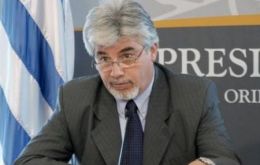
Uruguay will consult with Iran the possibility of exporting rice in exchange for oil, the government of President Jose Mujica said on Friday.
-
Wednesday, February 8th 2012 - 06:21 UTC
Uruguayan cabinet divided over how to address Argentine trade restrictions
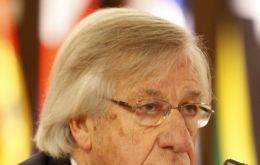
The latest round of imports’ restrictions imposed by the government of President Cristina Fernandez and how to address them have triggered a serious debate inside the ministerial cabinet of Uruguayan president Jose Mujica.
-
Thursday, August 25th 2011 - 00:34 UTC
Uruguay expects smallest wool clip in over a hundred years: 32 million kilos
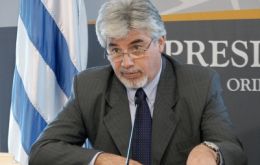
Uruguay is facing its smallest clip in over a hundred years and the 2011/2012 season’s wool production is estimated to be limited to 32 million kilos according to Joaquin Martinicorena, president of the Uruguay’s Wool Secretariat, SUL.
-
Wednesday, July 6th 2011 - 06:23 UTC
Poland warns trade agreements must abide by EU sanitary and food security standards

Poland which currently holds the rotating chair of the European Union presidency warned that any trade agreements with third parties must strictly abide by the EU sanitary and food security standards.
